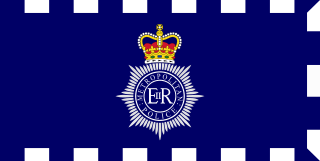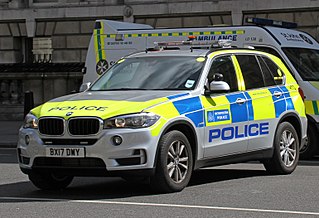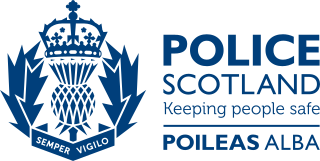
The Metropolitan Police Service (MPS), formerly and still commonly known as the Metropolitan Police and informally as the Met Police, the Met, Scotland Yard, or the Yard, is the territorial police force responsible for law enforcement in the Metropolitan Police District, which currently consists of the 32 London boroughs. The MPD does not include the "square mile" of the City of London, which is policed by the much smaller City of London Police.

The Police Service of Northern Ireland is the police force that serves Northern Ireland. It is the successor to the Royal Ulster Constabulary (RUC) after it was reformed and renamed in 2001 on the recommendation of the Patten Report.

Law enforcement in the United Kingdom is organised separately in each of the legal systems of the United Kingdom: England and Wales, Northern Ireland and Scotland. Most law enforcement is carried out by police officers serving in regional police services within one of those jurisdictions. These regional services are complemented by UK-wide agencies, such as the National Crime Agency and the national specialist units of certain territorial police forces, such as the Specialist Operations directorate of the Metropolitan Police.
The Specialist Firearms Command (SCO19) is the firearms unit of the Metropolitan Police Service. The Command is responsible for providing a firearms-response capability, assisting the rest of the service which is not routinely armed.

An authorised firearms officer (AFO) is a British police officer who is authorised, and has been trained, to carry and use firearms. The designation is significant because in the United Kingdom most police officers do not routinely carry firearms, although they can be equipped with tasers. The only forces where officers are routinely armed are the Police Service of Northern Ireland, the Ministry of Defence Police, the Civil Nuclear Constabulary, Belfast Harbour Police and the Belfast International Airport Constabulary.

An armed response vehicle (ARV) is a type of police car operated by police forces in the United Kingdom. ARVs are crewed by authorised firearms officers to respond to incidents believed to involve firearms or other high-risk situations. ARVs are specially adapted and modified to accommodate specialist equipment.
The Specialist Operations directorate is a unit of the Metropolitan Police of London, UK responsible for providing specialist policing capabilities including national security and counter-terrorism operations. The Specialist Operations Directorate is currently led by Assistant Commissioner Neil Basu.
The Territorial Support Group (TSG) is a Met Operations unit of London's Metropolitan Police Service (MPS). In 2012 it consisted of 793 officers and 29 support staff. It specialises in public order policing, amongst other specialist areas. The TSG is a uniformed unit of the MPS that replaced the similarly constituted Special Patrol Group in 1987. TSG units patrol the streets of London in marked police vans or "carriers"; using the call sign prefix "Uniform". Generally each carrier has an advanced (police) driver, seven constables and a sergeant. Territorial Support Groups often comprise three carriers, twenty one constables, and three sergeants reporting to an Inspector. They separately patrol designated areas experiencing serious levels of gang violence or disorder. When deployed, it is by the MPS Information Room. Due to the public order nature of their role often numerous carriers will be assigned. TSG officers can be identified as TSG from the distinctive "U" in their shoulder numbers. Some TSG officers, get the opportunity to be plain clothes officers, who gave a taser and cuffs.
A firearms unit is an armed unit within each territorial police force in the United Kingdom. For the most part, the police forces of the United Kingdom are unarmed; however, all have firearms units to provide the police force with the capability to deal with terrorists and armed criminals. A police officer cannot apply to join the firearms unit without first finishing their two-year probationary period, with a further two years in a core policing role for some forces. Firearms unit is the most common name outside of the capital, while that of London's Metropolitan Police Service is called the Specialist Firearms Command, Trojan or SC&O19. Within the media it is sometimes compared to the SWAT units of the United States.

The Special Assault Teams are police tactical units of the Japanese Police. They are established in major prefectural police departments supervised by the National Police Agency.

Essex Police is a territorial police force responsible for policing the county of Essex, in the east of England, consisting of over 1.8 million people and around 1,420 square miles (3,700 km2). It has over 3,800 police officers, including over 500 special constables.
The Traffic Operational Command Unit (OCU), formally known as CO15, was the Road Policing Unit for the Metropolitan Police Service.
The Roads Policing Unit (RPU) is the motorway and trunk-road police unit of a British police force.
The United Kingdom is made up of four constituent countries: England, Scotland, Wales, and Northern Ireland. In Northern Ireland, all police officers carry firearms. In the rest of the United Kingdom, only some police officers carry firearms; that duty is instead carried out by specially-trained firearms officers. This originates from the formation of the Metropolitan Police Service in the 19th century, when police were not armed, partly to counter public fears and objections over armed enforcers as this had been previously seen due to the British Army maintaining order when needed. The arming of police in Great Britain is a perennial topic of debate.
The police forces in the UK use a wide range of operational vehicles including compact cars, powerful estates and armoured police carriers. The main uses are patrol, response, tactical pursuit, and public order policing. Other vehicles used by British police include motorcycles, aircraft, and boats.

The Protection Command is one of the Commands within the Specialist Operations directorate of London's Metropolitan Police Service. The command specialises in protective security and has two branches: Royalty and Specialist Protection (RaSP), providing protection to the Royal Family and close protection to government officials, and Parliamentary and Diplomatic Protection (PaDP), providing uniformed security to government buildings, officials and diplomats. In contrast with the vast majority of British police officers, many members of the Protection Command routinely carry firearms in the course of their duties and all are Authorised Firearms Officers.
Armed Support Units (ASU) are specialist armed response units of the Garda Síochána, the national police force of Ireland. Based in all six Garda regions in the country, Garda ASU officers carry a combination of lethal firearms and non-lethal weapons, as opposed to regular uniformed Gardaí who are unarmed. They are similar to Authorised Firearms Officers of British police forces.

Police Scotland, legally named the Police Service of Scotland, is the national police force of Scotland. It was formed in 2013, with the merger of eight regional police forces in Scotland, as well as the specialist services of the Scottish Police Services Authority, including the Scottish Crime and Drug Enforcement Agency. Although not formally absorbing it, the merger also resulted in the winding up of the Association of Chief Police Officers in Scotland.









